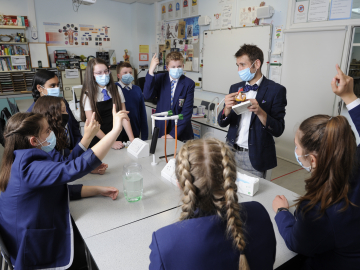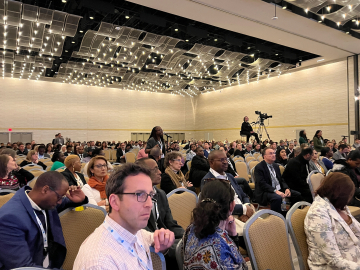Packaging Those Inconvenient Truths
ATLANTA—Can climate change deniers and skeptics be converted? For beleaguered believers bent on trying, a communications panel at the Climate & Health Meeting here last Friday offered some concrete advice.
First of all, panelists emphasized that solutions are out there. Matt James, of the David and Lucile Packard Foundation, reminded everyone that there has never been a campaign that successfully changed thinking on a major issue like climate change that did not offer people hope.
But along with the dose of hope, the meeting delivered some intriguing insights from a converted skeptic: Jerry Taylor, president of the Niskanen Center, a libertarian think tank. During his time at the Cato Institute, he helped write the script for climate skeptics.
As a result, he understands the arguments, and what motivates climate skeptics. He also understands what can move people away from those arguments—because he himself was persuaded. “Over the course of 20 years of wrestling with the climate bear, I lost. And unlike most of my colleagues I decided that when you lose an argument it’s probably best to drop your old position and adopt a newer one,” Taylor said.
He believes that tribal political leaders, for the most part, drive public opinion—and “if your message is at odds (with their views) you’re swimming against a very strong tide.” But he thinks it’s possible to change views of leaders with an approach centered on the following principles:
- Do not overstate the uncertainty in play about just how bad the impact of climate change will be.
- Talking about risk management works; when there is a broad range of possible outcomes, you hedge your bets.
- Emphasize co-benefits—including the health benefits of addressing fossil fuels and conventional energy.
Finally, Taylor emphasized that it’s not really doubt over the science at the core of the skeptics worldview. It’s the concern that “if you acknowledge climate change, it will lead to de facto deindustrialization, massive energy price increases, and a massive expansion in government.” But solutions exist that don’t require destroying the free market, he said, but instead harness markets and prices to reduce greenhouse gas emissions and carbon pollution.
But climate change is a really complicated topic to discuss, Ed Maibach, director of the Center of Climate Change Communication at George Mason University, told the panel. And from a communication perspective, he said, “complication is an anathema to effective communication.”
“Every major public health victory of the last century has had effective communication at its heart,” Maibach emphasized. What that translates to, according to Maibach: simple, clear messages, repeated often, by a variety of trusted voices are best. The less you say, the more you are heard.
Another panelist, Susan E. Pacheco, MD, associate professor of Pediatric Allergy and Immunology at the University of Texas McGovern Medical School, added that the use of personal stories and patient narratives is a powerful tool. She drove home the impact of a Texas heat wave, for example, by including the image of a child who has to wear a cooling vest on hot days because of heat sensitivity. That approach can help people see that the health effects are real and could affect their children, too.
But still, Americans view climate change as a distant problem—“a plants penguins and polar bears problem,” rather than a people problem, as Maibach said. To reframe the issue, conveying how climate change affects all of us is key. These 5 points can help drive home that message, according to Maibach:
- There is expert consensus
- It’s real
- It’s us (human-caused)
- It’s bad (for people)
- It’s solvable
The messenger matters, too—and health professionals are trusted voices in communities. “We’re in an age of unbelievable erosion of public trust, but the public trusts doctors and nurses above all others … and on the issue of climate change, the public trusts you above all other sources,” Maibach said.
Health professionals can reinforce these messages and deliver a message of hope. “The most important actions we can take are to reduce energy waste, and fully embrace clean energy. When we do that, we clean up our air and our water, and we all immediately enjoy better heath,” Maibach said.
Join the thousands of subscribers who rely on Global Health NOW summaries and exclusive articles for the latest public health news. Sign up for our free weekday enewsletter, and please share the link with friends and colleagues: Subscribe to GHN
iStock





